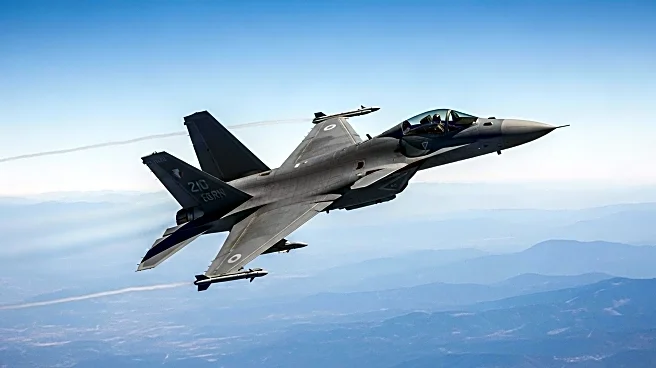What's Happening?
Two British military aircraft, supported by the U.S. Air Force, conducted a 12-hour patrolling flight near the Russian border. This operation, reported by the Royal Air Force (RAF) on October 10, was a response to recent airspace violations by Russia targeting several NATO countries, including Poland, Romania, and Estonia. The mission involved an RAF RC-135 Rivet Joint electronic surveillance aircraft and a P-8A Poseidon maritime patrol aircraft, with aerial refueling provided by a U.S. Air Force KC-135 tanker. U.K. Defense Minister John Healey emphasized the mission's significance in providing valuable intelligence and demonstrating NATO unity against Russian aggression. Recent incidents include Russian drones entering Polish and Romanian airspace, and Russian MiG-31 fighters breaching Estonian airspace, prompting NATO consultations.
Why It's Important?
The flight underscores NATO's commitment to collective defense and deterrence in the face of increasing Russian provocations. By conducting joint operations, NATO aims to enhance its operational awareness and send a clear message of unity to Russia. The recent airspace violations highlight the ongoing tensions between NATO and Russia, with potential implications for regional security and stability. The involvement of multiple NATO countries in these operations reflects the alliance's strategic approach to countering Russian threats and maintaining the integrity of its member states' airspace.
What's Next?
NATO may continue to conduct similar operations to monitor and deter Russian activities near its borders. The alliance could also increase its military presence and readiness in Eastern Europe to reassure member states and deter further Russian provocations. Diplomatic efforts may be intensified to address the security concerns raised by these incidents, potentially leading to further consultations under NATO's Article 4. The situation may prompt discussions on enhancing air defense systems and security cooperation among NATO members.
Beyond the Headlines
The ongoing tensions between NATO and Russia could have broader implications for international relations and global security dynamics. The increased military activity near Russian borders may lead to heightened geopolitical risks and influence defense policies in Europe. The situation also raises ethical and legal questions regarding airspace sovereignty and the use of military force in response to violations. Long-term shifts in NATO's strategic priorities and defense posture may be triggered by these developments.











